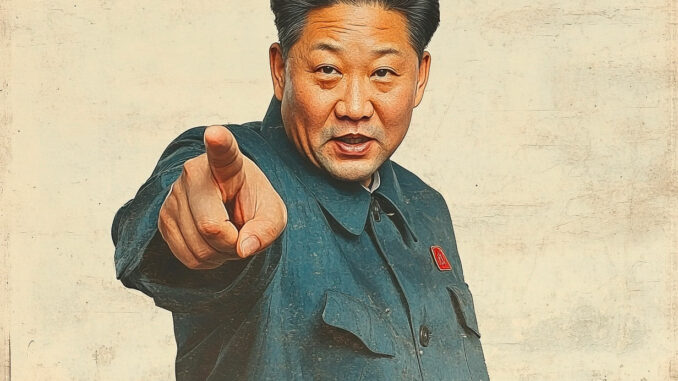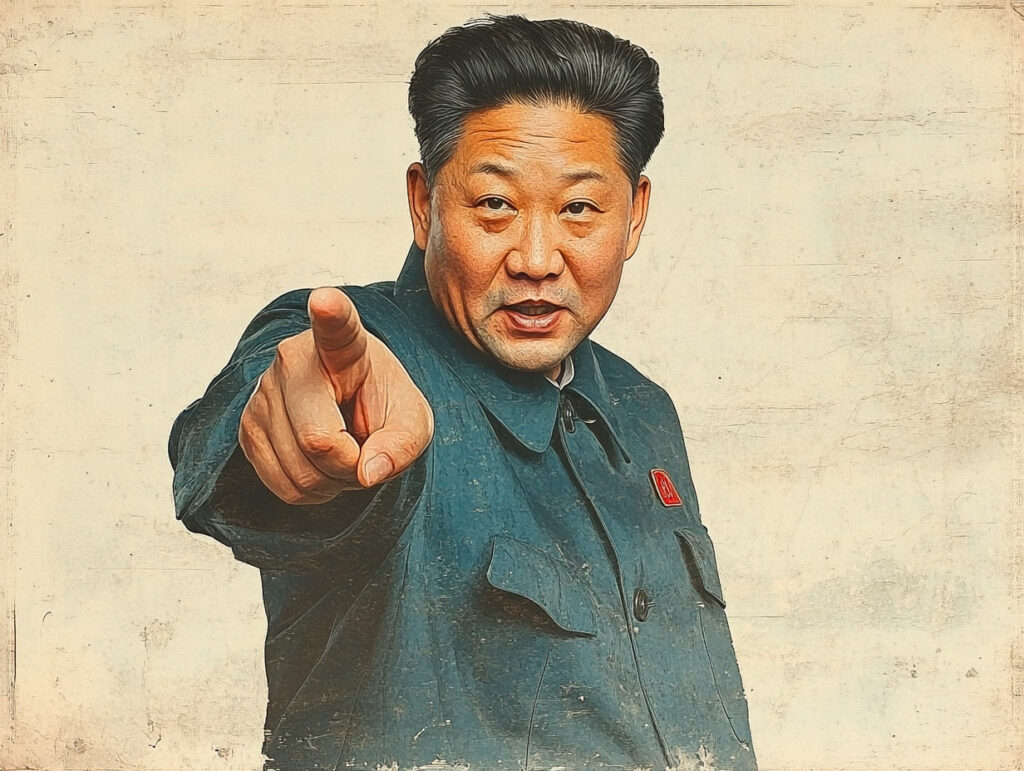
Analysis of tensions between China and North Korea due to the Pyongyang-Moscow alliance, the impact of the Korean War (1950-53) and the challenges posed by North Korea’s nuclear program.
China is concerned about the growing alliance between North Korea and Russia, motivated by North Korean arms deliveries for the conflict in Ukraine. This situation is undermining China’s historic influence over Pyongyang. Since the Korean War (1950-1953), marked by the Russian-backed North Korean invasion and massive Chinese intervention, Sino-North Korean relations have remained complex. In 2005, China attempted to resolve the North Korean nuclear crisis through six-party talks, but without success. North Korea remains a regional threat, with a failing economy and a refusal to reform. China fears a collapse of the regime, which would lead to an influx of refugees and unification under South Korean influence, threatening its strategic interests.

Geopolitical context: China faces the Russian-North Korean alliance
China is watching the evolution of relations between North Korea and Russia with concern. Since the start of the conflict in Ukraine in 2022, Pyongyang has supplied Moscow with weapons, ammunition, and even soldiers, receiving substantial payments in return. According to Reuters, up to 50% of the ammunition used by Russia in Ukraine comes from North Korea, with estimates of 5,000 to 11,000 North Korean soldiers killed in the conflict. These transactions are said to have earned Pyongyang around €20 billion, bolstering its cash-strapped economy. This opportunistic alliance has allowed North Korea to reduce its dependence on China, its traditional patron, which has historically dominated its economic and political relations.
This dynamic is problematic for Beijing. China has always sought to maintain strategic control over North Korea to avoid instability along its 1,420 km-long northeastern border. A rapprochement with Russia threatens this balance, as it gives Pyongyang a geopolitical alternative. For example, in 2024, Russia supplied oil and technology to North Korea, circumventing international sanctions. This strengthens Pyongyang’s ability to pursue its nuclear and ballistic missile programs, defying Chinese efforts to limit these activities. Beijing is waiting for the end of the Ukrainian conflict to reassert its influence, but this waiting period reveals a crack in its regional authority.
The consequences of this shift are manifold. First, a more autonomous North Korea complicates China’s efforts to stabilize the Korean peninsula. Second, the influx of financial and material resources to Pyongyang could prolong the viability of Kim Jong-un’s regime, making the economic reforms that China encourages less likely. Finally, this situation exacerbates tensions with the US, South Korea, and Japan, which perceive the Russian-North Korean alliance as an increased threat to regional security.
Legacy of the Korean War: a conflict with deep roots
The Korean War (1950-1953) remains a defining factor in Sino-North Korean relations. Launched on June 25, 1950, with the invasion of South Korea by North Korea, under orders from Joseph Stalin and with the approval of Mao Zedong, it caused massive losses: 1.5 million deaths on the communist side, the majority of whom were Chinese soldiers, 415,000 South Korean deaths, 33,651 American deaths, and approximately 2 million civilians killed, mainly in North Korea. The Chinese intervention in late 1950, with approximately 1.45 million soldiers, prevented the collapse of the North Korean regime in the face of UN forces led by the United States.
The conflict ended with an armistice signed on July 27, 1953, establishing the Demilitarized Zone (DMZ), 4 km wide and 250 km long, which still divides the peninsula. No peace treaty has been signed, maintaining a technical state of war. Russian archives, declassified in the 1990s, confirm that Kim Il-sung, appointed by Stalin, launched the invasion to unify Korea under a communist regime. By supporting this offensive, China consolidated its role as North Korea’s protector, but at a high human cost, with around 1 million Chinese casualties, including Mao’s son, Mao Anying.
This legacy still influences bilateral relations. China maintains an official narrative that South Korea provoked the conflict, although a 2010 article in a Chinese journal admitted North Korean responsibility before being censored. This censorship reflects Beijing’s desire to preserve its relations with Pyongyang, despite uncomfortable historical truths. The consequences include persistent mistrust between China and North Korea, as well as difficulty in promoting reforms in North Korea, where the regime relies on propaganda to justify its militarism.
2005 nuclear negotiations: a revealing failure
In 2005, China organized six-party talks (China, Russia, Japan, South Korea, the US, and North Korea) to resolve the North Korean nuclear crisis. Beijing proposed that North Korea abandon its nuclear weapons and ballistic missiles in exchange for international economic aid. The talks stalled over the speed of aid delivery and the rigor of inspections to verify dismantlement. The United States, South Korea, and Japan, skeptical of Pyongyang’s repeated and unfulfilled promises, rejected the agreement.
North Korea’s nuclear program, which began in the 1980s, now includes about 50 nuclear warheads and missiles capable of reaching 4,000 km, threatening Japan and US bases in the Pacific. In 2023, North Korea carried out a record 37 missile launches, defying UN sanctions. China, although in favor of denuclearization, prioritizes regional stability to avoid an influx of refugees (estimated at 1 million in the event of the regime’s collapse) and unification under South Korean control, which would place a US-allied democracy on its border.
The consequences of this failure are significant. The lack of agreement has allowed North Korea to strengthen its arsenal, increasing regional tensions. By avoiding putting too much pressure on Pyongyang, China maintains limited influence but preserves a strategic buffer against US forces in South Korea, where 28,500 troops are stationed. However, this complicates its relations with Washington and Seoul, which are demanding a firmer stance.

North Korea’s economy: a failed model
The North Korean economy, characterized by centralized planning, collapsed after the end of the USSR in 1991. During the 1950s and 1960s, reconstruction, supported by Soviet aid, led to industrial growth, with factories, mines, and railways inherited from the Japanese occupation (1904-1945). However, by the 1980s, the priority given to military spending (around 25% of GDP, or $2.5 billion annually) and the lack of international markets led to a crisis. The famine of the 1990s killed between 2 and 3 million people, or 10 to 15% of the population.
In comparison, South Korea prospered thanks to foreign investment and a market economy. In 2023, its GDP stood at €1.7 trillion, compared with €25 billion for North Korea. China is pushing Pyongyang to adopt reforms similar to those launched by Deng Xiaoping in the 1980s, but the North Korean regime, fearing a loss of control, is resisting. The consequences include increased dependence on foreign aid, particularly from China, and a constant risk of internal instability, which could destabilize the entire region.
Outlook: challenges and future scenarios
The future of Sino-North Korean relations depends on several factors. First, the end of the conflict in Ukraine could reduce Russian influence over Pyongyang, allowing China to reassert its control. Second, a worsening of the North Korean economic crisis could force reforms or cause the regime to collapse, with serious humanitarian consequences. Third, an escalation of North Korea’s nuclear program could prompt a military response from the US or South Korea, upsetting the regional balance.
China must navigate between stability and international pressure. Maintaining the status quo protects its interests but alienates its Western partners. A more aggressive approach toward Pyongyang risks precipitating a crisis. The consequences of mismanagement could include a migration crisis, military escalation, or Korean unification unfavorable to Beijing.
War Wings Daily is an independant magazine.